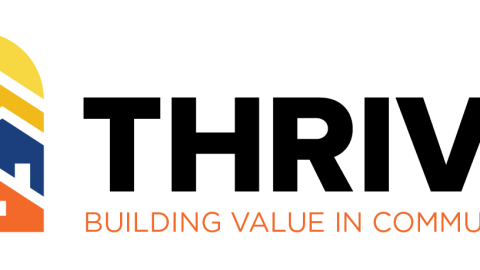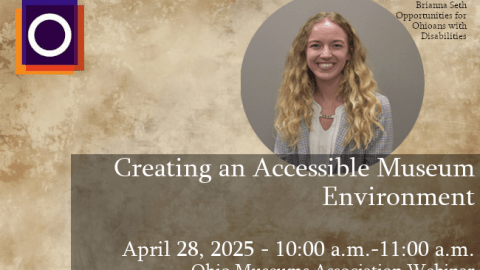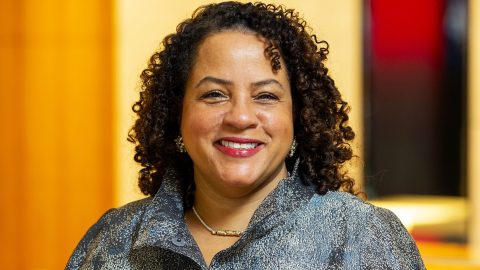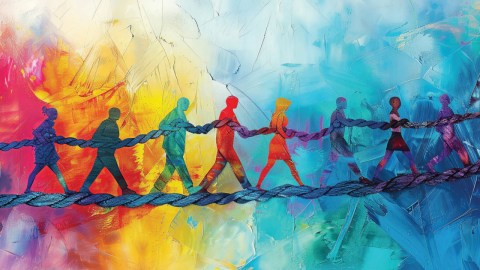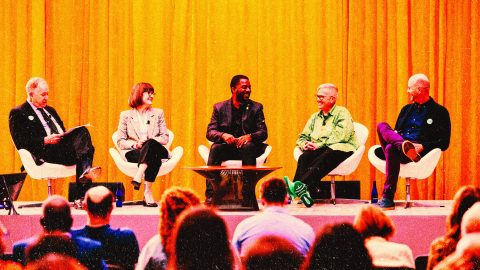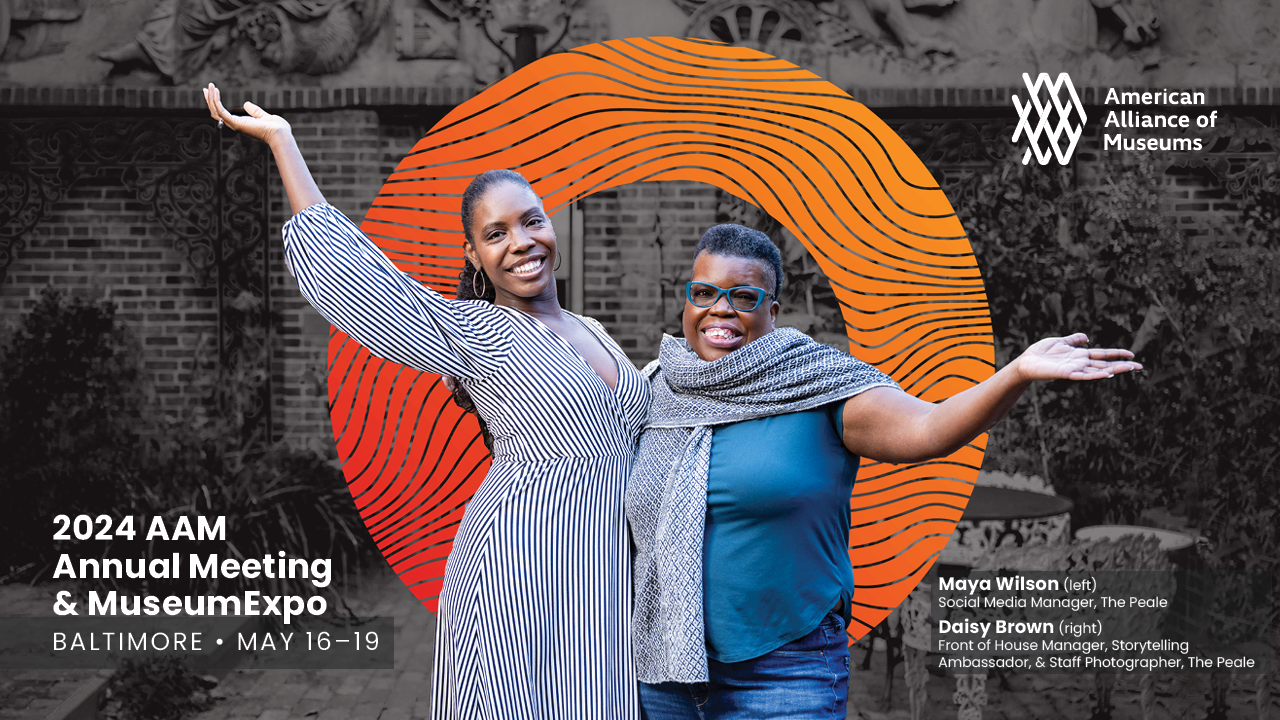
Hello museum people—I hope to see you in Baltimore, MD, May 16-19 for the 2024 Annual Meeting and MuseumExpo.
There are always so many great sessions on the program that a common quandary for attendees is the difficulty of choosing between so many good sessions. In this post, I’m sharing my suggestions for a futurist schedule at the meeting, filtering the program through the lens of topics covered in current and past trends reports from CFM. I hope it helps you plan your agenda for May, and perhaps prompt you to register, if you have not done so already. Early bird registration closes Friday, February 2!
Thursday, May 16
9 am- 4 pm
Diving into the Future: A CFM Foresight Workshop centered on Repatriation, Restitution, and Reparations
This year I’ve expanded the annual foresight workshop to a full day, and tied it to CFM’s Next Horizon of Museum Practice project, in order to help museums create a better future with regard to voluntary repatriation, restitution, and reparations. In the morning, I will introduce the Three Horizons foresight methodology guiding the process, and attendees will practice the use of scenarios and backcasting to build preferred futures. In the afternoon, we will be joined by some of the authors contributing to this project, who will invite attendees to engage with their visions of desirable futures.
Every time I’ve offered a workshop at the annual meeting it has filled up quickly (and then people show up on the day of, looking to snag an empty seat). This year we’ve expanded capacity to serve more people, but registration is capped at 100, so buy your ticket soon! (The $75 ticket price covers lunch and coffee breaks.) Tickets can be purchased at the end of the registration process for new registrants or added onto existing registrants in the Attendee Service Center for all the early birds out there.
Friday, May 17
11:30 am – 12:30 pm
Alternative Realities: Shaping Our Collective Climate Future Today
In this session, panelists will explore the role exhibitions play today in shifting attitudes and building a sustainable future in the face of our collective climate crisis. As I note in this year’s TrendsWatch, when communicating about the climate crisis, museums are caught between the need to convey the gravity of the situation, and the danger of inducing an apathy born of despair. These examples, from the Arizona Science Center, the Anchorage Museum, and The Wild Center, offer lessons on how to thread that needle: helping people imagine how climate change may change their future, while making them feel empowered to take action.
2:00 – 3:00 pm
Impact Investing: Putting your museum’s money where your values are
Impact investing means managing funds in order to generate positive, measurable social and environmental impact in addition to financial returns. Laura Callanan, founding partner of the nonprofit Upstart Co-Lab and former Senior Deputy Chair of the National Endowment of the Arts, has long been a mentor and advisor to CFM on this topic. In this panel, she leads an update on how impact investing is taking hold in the museum world, joined by Judy Gradwohl, President and CEO of the San Diego Natural History Museum; Lillie Moreno, Vice President of Financial Planning and Analysis at the John G. Shedd Aquarium; Michelle RhodesBrown, Chief Financial Officer at the Walters Art Museum; and Noelle Laing, Chief Investment Officer at the impact platform Builders Vision.
3:20 – 3:45 pm
Reducing Carbon Emissions in a Complex Environment
This flash session looks inwards at climate action, profiling how the Heritage Museum and Garden on Cape Cod created a Strategic Sustainability Plan to guide them to carbon neutrality by 2040 through documenting and analyzing their current energy use, tracking carbon sequestration provided by the trees and shrubs in their 100-acre campus, and sustainable design strategies. Come to this session to snag some ideas you can apply toward crafting a sustainability plan for your own museum.
Saturday, May 18
8:30 – 9:30 am
Rematriation of the In‘zhúje‘waxóbe / Sacred Red Rock
This case study illustrates cultural shifts in museums and society towards recognizing the spiritual and cultural standing of “natural” objects, in this case, a red Siouxan quartzite boulder that was placed in Robinson Park, Lawrence, Kansas, as a memorial to the city’s “founders” in 1929. This collaborative project relocated In‘zhúje‘waxóbe –the Sacred Red Rock—to lands belonging to the Kaw Nation, created interpretation and infrastructure, and documented the sacred rock’s history and cultural significance. James Pepper Henry, Director and CEO of the First Americans Museum will be joined by Sydney Brooke Pursel, Curator for Public Practice at the Spencer Museum of Art, and by Diane Lochner and Thomas Owen, Vice Presidents at PGAV Destinations.
10:10 – 11:10 am
Measuring Social & Environmental Impact: The UN SDGs & Museums
I’m THRILLED that Dr. Stephanie Capaldo, lecturer in Public & Environmental Humanities and Sustainability Studies at Boise State University, is making the case for applying the UN Sustainable Development Goals (SDGs) to museum practice. I once had the honor of keynoting at a Sharing is Caring Conference in Finland, arguing that museums can play a critical role in achieving the SDGs, and look forward to hearing Dr. Capaldo advance this proposition.
11:30 am – 12:30 pm
Confronting colonialism: Intersections of scientific and cultural knowledge
It may sound trite to say that museums should act in service to their community—but which community, and how can museums reconcile the interests and values of different communities? This session examines the slow shift in museum practice towards applying Indigenous knowledge in collecting, research, and interpretive practices through the case of two museums facing decisions regarding whether to collect specimens with significant (and significantly different) value to scientists and Indigenous peoples. Hae Su Oh, Amy Gusick and Miguel Ordeñana of the Natural History Museum of Los Angeles County, and Gabrielle Crow of the Gabrielino-Shoshone Tribal Council of Southern California, talk about P-22, LA’s famous and beloved mountain lion, who died in 2022 after being hit by a car. Migoto Eria and Philip Edgar of the Museum of New Zealand Te Papa Tongarewa discuss the museum’s response to a giant leatherback turtle that washed ashore on the South Island in 2019.
2:00 – 3:00 pm
While there are many great sessions in this time slot, you can’t expect me NOT to encourage you to attend TrendsWatch: Your Annual Glimpse of the Future, where I get to riff on this year’s topics—the new round of culture wars, the race to achieve carbon neutrality, generative AI, and the US’s current epidemic of loneliness. I’ll share updates on how these trends are playing out in 2024, and offer some unfiltered observations that may not have made it into the report.
That said, I would be entirely sympathetic if you attend Prison Prisms: Museums, Carceral History, and Criminal Justice Reform instead. (I’d be in that audience if I were not speaking at the same time!) Presenters at this session will explore “how museums can best serve their communities in an age of mass incarceration.” (You might prep for the session by reading this article on museums and mass incarceration from TrendsWatch 2017.)
3:20 – 4:20 pm
Algorithms & Artifacts: Deciphering AI’s Role in Museums
Two of my favorite museum technologists, Jack Ludden and Nik Honeysett from the Balboa Park Online Collaborative, join Uma Nair of The Strategic Museum, Jonathan Muar of Bloomberg Philanthropies, and Jessica Herczeg Konecny from the Metropolitan Museum of Art to examine the promise and perils of Artificial Intelligence. They promise to explore “how the museum community can approach AI with a balanced perspective, harnessing its potential while being mindful of its implications.” Good stuff.
Sunday, May 19
This day is mostly devoted to workshops, and here are a few that caught my eye:
8:30 – 10 am
Educating for American Democracy: Tools for Civic Learning in Museums
In last year’s TrendsWatch coverage of The Partisan Divide, one major recommendation for how “Museums might…” address this trend was to provide the education needed to support civic activism. This workshop will lead participants in an exploration of examples and help them “road test” tools for integrating inquiry-based civics learning into their practice.. Led by Sarah Jencks, of Every Museum a Civic Museum; Carrie Kotcho, National Museum of American History; Tess Benoit, The History Co:Lab; and Zoe Morgan, Conner Prairie.
10:20 – 11:50 am
Trust the Process: Working with Others to Reimagine Object Interpretation
One enduring trend of this century is societies’ struggle over what to do with monuments that glorify people and behavior that no longer seem admirable. In this workshop, participants will learn lessons derived from the Chazen Museum of Art’s re:mancipation project, which recontextualizing an overtly racist sculpture from its collection. Amy Gilman and Janine Yorimoto-Bolt from the Chazen, multi-media artist Sanford Biggers, and Mark Hines of the MASK Consortium will mine the project for advice other organizations might apply to similar challenges.
1:00 – 2:30 pm
Climate Resilience Resources for cultural organizations and communities
Stephanie Shapiro, of Environment and Culture Partners and José Ortiz, from the Sila M. Calderon Foundation in Puerto Rico, will introduce participants to the new Climate Resilience Resources online toolkit designed to help stewards of cultural heritage and their communities adapt to the destruction wreaked by climate change. Chances are that your museum is in a region facing increased risk from heat, fire, drought, flood, storm, or rising tides. How can you use this toolkit to craft your response?
3:00 – 4:30 pm
#NeverTooYoung: Historical Truth-Telling in the Museum With K-8 Learners
Francie LaTour, Director and co-founder of Wee The People, invites participants to choose one or two objects from their museums’ permanent collection that are, or could be, featured in a family guide (and directs you to send her links or PDFs in advance of the workshop). How could your museum use these objects as jumping-off points for anticolonial learning/unlearning with kids? She will use three objects from Boston’s Isabella Steward Gardner Museum to illustrate this approach to challenging dominant narratives with some of museums’ youngest visitors.
Welp, those are some of my favorite futurist picks for the conference. I’d love to hear what sessions you are excited about–please share in the comments, below. And see you in Baltimore!

